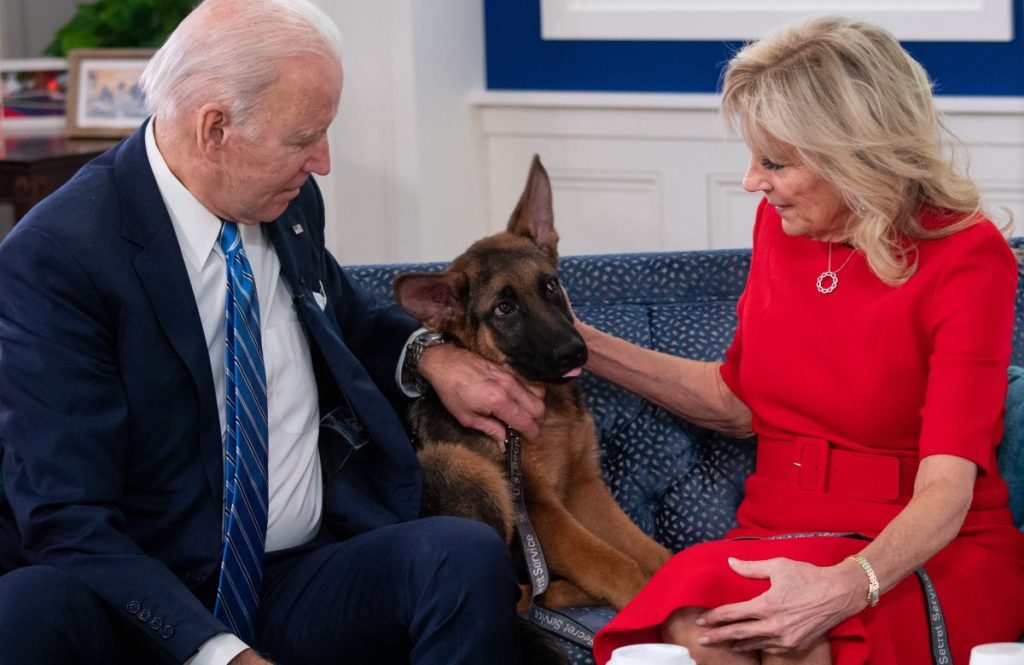Part of being a responsible dog parent is getting your pup appropriate training. Proper training ensures your canine companion can be safe and successful in the human world. President Joe Biden is turning his attention toward that task because one of his dogs, Commander, is having issues with biting.
Biden’s dog getting training following biting incidents
According to CNN, the younger of Biden’s German Shepherd dogs has “been involved in several biting incidents at the White House and in Delaware.”
Conservative group Judicial Watch obtained U.S. Secret Service emails revealing that agency personnel have concerns about safety around Commander.
Apparently, there have been 10 incidents involving the 22-month-old pup. One incident required treatment at a local hospital after Commander “clamped down” on an officer’s thighs and arm. Another incident occurred when the first lady, Dr. Jill Biden, “couldn’t regain control” of Commander. The dog allegedly charged a Secret Service staff member. According to the emails, other incidents happened while Commander was walking the grounds off-leash.
“I believe it’s only a matter of time before an agent/officer is attacked or bit,” the staff member wrote in an email.
Unfortunately, Biden’s other canine companion, Major, also has a history of biting. He moved out of the White House due to the issue.
White House responds to concerns about dog’s behavior
The White House responded to these claims and said the Bidens are “working through new training for the family pet following the incidents,” according to CNN.
“The White House complex is a unique and often stressful environment for family pets, and the First Family is working through ways to make this situation better for everyone,” said Elizabeth Alexander, communications director for the first lady.
“They have been partnering with the Secret Service and Executive Residence staff on additional leashing protocols and training, as well as establishing designated areas for Commander to run and exercise,” she continued.
“The President and First Lady are incredibly grateful to the Secret Service and Executive Residence staff for all they do to keep them, their family, and the country safe,” she added.
Anthony Guglielmi, the chief of communications for the U.S. Secret Service, said the agency is “aware” of the incidents. The Secret Service followed procedures for workplace injuries in each of the incidents.
“For the past several presidential administrations, the Secret Services has navigated how to best operate around family pets and these incidents are no exception. We take the safety and wellbeing of our employees extremely seriously,” Guglielmi said. He emphasized that employees should report job-related injuries, including those involving the first family’s pets.
“We are aware of past incidents involving first-family pets and these instances were treated similarly to comparable workplace injuries, to include with relevant notifications and reporting procedures followed,” he said.
While Secret Service special agents and officers do not handle the first family’s pets, they do “continuously work with all applicable entities to minimize adverse impacts in an environment that includes pets,” according to Gugliemi.
What to do if your dog starts biting
If your beloved fur baby suddenly starts biting, it’s essential to respond with empathy, understanding, and positive reinforcement.
First and foremost, remember that dogs communicate through various behaviors. Biting might be their way of expressing fear, anxiety, or discomfort. Avoid any negative reactions such as yelling or punishing the dog. Punishment may exacerbate the issue and erode the trust between you and your canine companion.
Instead, focus on identifying the root cause of the biting behavior. Observe your dog’s body language and the circumstances surrounding the incidents. This information can provide valuable insight. Seek the guidance of a professional dog trainer or animal behaviorist. They can help you understand your dog’s needs better. Then, they’ll develop an appropriate training plan. Positive reinforcement training techniques, such as reward-based training and clicker training, can be incredibly effective. These techniques encourage desirable behaviors and discourage biting tendencies.
As a responsible dog parent, creating a safe and enriching environment for your dog — and the people they interact with — is crucial. Regular exercise, mental stimulation, and socialization with other well-behaved dogs can contribute to your pup’s overall well-being. These activities can also help reduce your dog’s stress and anxiety.
Patience, consistency, and a gentle approach will go a long way in fostering a positive and trusting relationship with your four-legged friend. Remember to address biting tendencies in a humane and constructive manner. With love and proper training, your dog can likely overcome such challenges and continue to be your loyal and affectionate companion.









